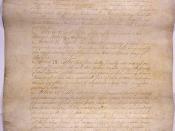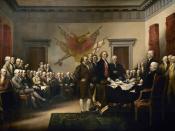Congress authorised the Philadelphia Convention of 1787 for 'the sole and express purpose of revising the articles of Confederation' . It had been intended to bring delegates from all thirteen states in order to clarify in constitutional form many issues but above all to ensure and strengthen the union of these thirteen states. However such a task would prove very difficult as a result of the many centrifugal forces, which existed between the states, along with the divided and wholly unrepresentative nature of the delegations present. Under such circumstances where to result in numerous areas of contention were to emerge. However the determination to preserve the union and the spirit or comprise and co-operation adopted by the delegates would result in the successful completion of the world's most famous constitution.
The initial problem faced by the convention was the delegates themselves. The state legislatures had appointed seventy-four delegates yet only fifty-five were to attend.
The tiny state of Rhode Island was, 'so ridden by factionalism that its legislature was unable to appoint any delegates.' The delegations of New Hampshire and New York were also neutered due to late arrivals and internal divisions respectively. This scenario threatened the prestige of the delegations and hence the credibility of their final decisions.
Secondly the delegations themselves were completely unrepresentative since 'almost all were planters, merchants or lawyers' . This therefore, left huge parts of the society unrepresented, not only blacks and women, but also the entire lower class. More importantly, it saw the emergence of external pressure groups who sought to further their personal causes.
However the convention was able to solve this dual problem of prestige and public pressure very effectively. With the enlisting of veterans of the War of Independence and national heroes such as Benjamin Franklin and George Washington, few...


